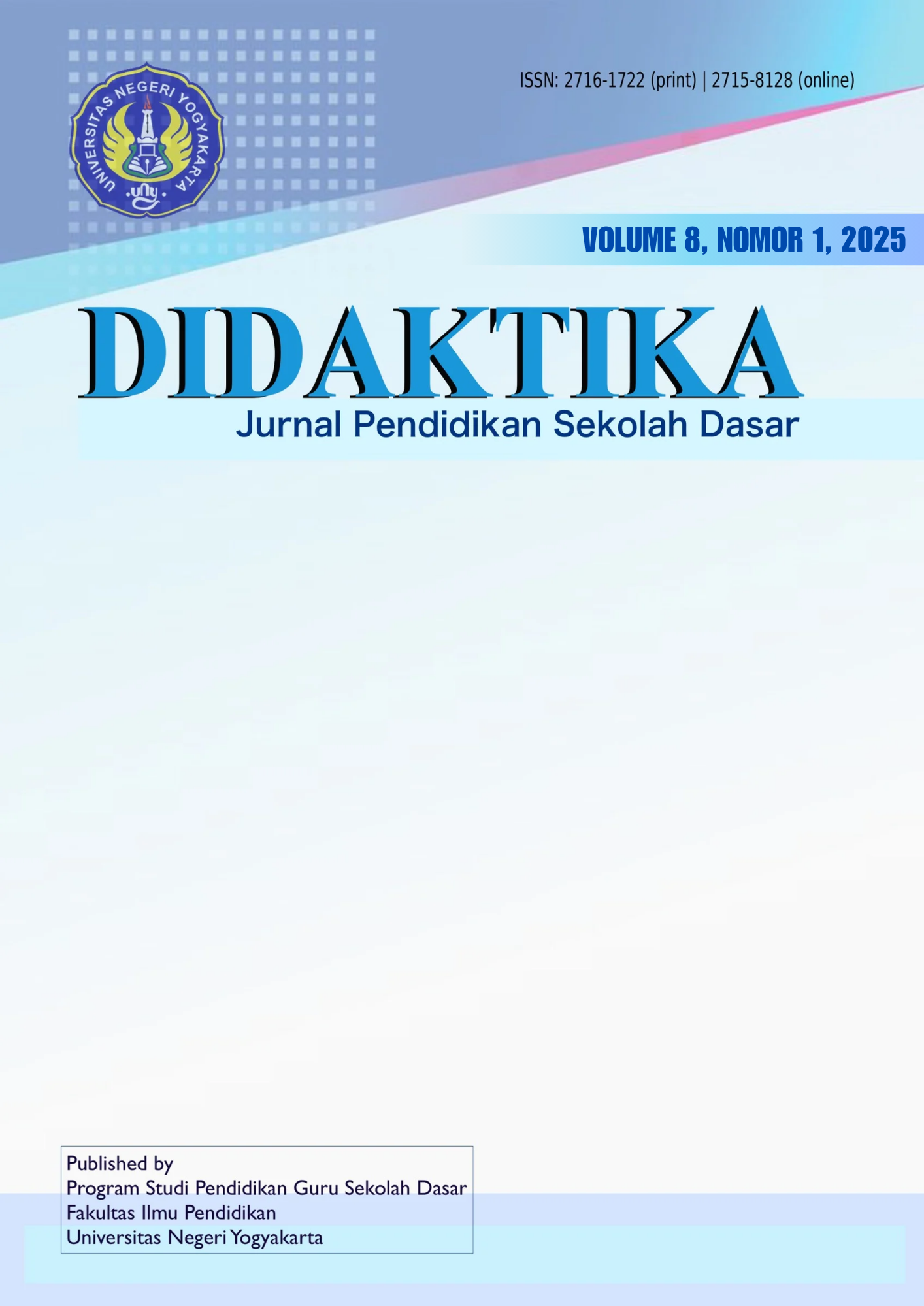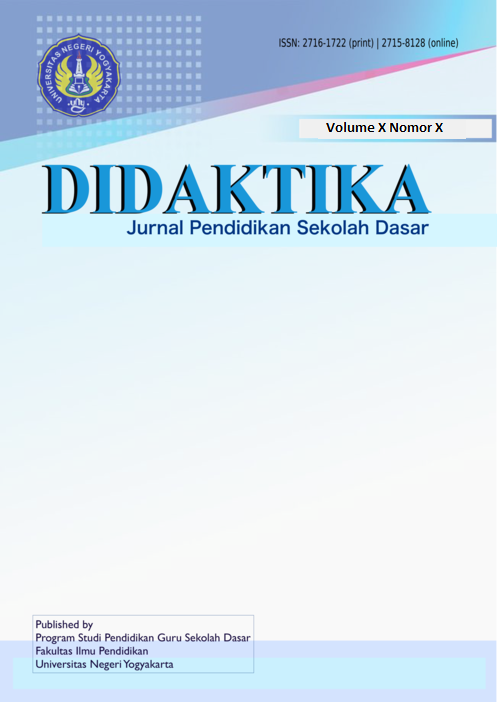Literature Review: The Application of Think Talk Write (TTW) Model to the Writing Skills of Learners in Elementary School
DOI:
https://doi.org/10.21831/didaktika.v8i1.85328Abstract
Writing is one of the four main components of language skills, namely speaking, listening, reading and writing. Writing has a very important role in conveying concepts and ideas in depth and structure, both in the form of fiction and non-fiction. This confirms that the ability to write is not only a basic skill in communication, but also an important means of expressing human thoughts and emotions. This research is a literature review that involves analysis of various articles that examine the Think Talk Write (TTW) model and writing skills. The articles used are sourced from Google Scholar and Scopus. The articles used were articles published between 2019 and 2024 and 25 relevant articles were found. This research aims to analyze the application of the Think Talk Write (TTW) learning model to the writing skills of elementary school students in several types of text writing material in Indonesian language subjects. Apart from that, this research also discusses the application of the Think Talk Write (TTW) model with the help of several types of learning media. Based on data analysis, it is proven that the Think Talk Write (TTW) model improves students' writing skills in elementary schools.
References
Ahmad, A., Efitasari, N., Aini, P., & Faddilah, Y. (2024). Application of TTW (Think Talk Write) Model assisted by Interactive Multimedia to Elementary Students' Writing Skills. Cendikia: Journal of Education and Teaching, 2(2), 180-192.
Ariani, N., Masruro, Z., Saragih, S., Hasibuan, R., Simamora, S., & Toni. (2022). Learning and Learning. Bandung: Widina Bhakti Persada.
A'yun, P., & Liansari, V. (2024). The Effect of Think Talk Write Model on the Narrative Writing Ability of Elementary School Students. Journal of Educatio FKIP UNMA, 10(4), 1198- 1205.
Azzam, M., & Baniabdelrahman, A. (2023). The Effect of "Think-Talk-Write" Strategy on EFL Tenth-Grade Students' Writing Performance. Journal of International Education and Practice, 6(01).
Bahri, A., Rahamma, T., & Idkhan, M. (2023). Interactive-based Language Skills and Literature Appreciation. Sukabumi: CV Haura Utama.
Citriadin, Y. (2019). Introduction to Education. Mataram: CV Sanabil.
Darmawangsa, D., Mutiarsih, Y., & Karimah, I. (2020). Think, Talk, Write Strategy in French Writing Skill Learning. In 4th International Conference on Language, Literature, Culture, and Education, 143-148.
Farsyafat, K. (2020). Application of Think Talk Write Learning Model to Improve the Writing Skills of Instruction Text. Educational Journal of Bhayangkara, 1(1), 23-34.
Fatihatin, D., Fakhriyah, F., & Kironoratri, L. (2024). The Effect of Think Talk Write (TTW) Learning Model Assisted by Padiku Flipbook Media on Writing Skills of Fifth Grade Students. Journal of Basic Education Research, 10(2), 604-618.
Firdausia, L., & Al Masjid, A. (2024). Analysis of the Application of the Think Talk Write (TTW) Cooperative Model on Narrative Writing Skills in Elementary School Students. Scientific Journal of Basic Education, 9(2), 7680-7693.
Fuad, M., Wahyuni, E., & Yaqin, M. (2023). Development of Mind Map-Based Teaching Materials to Improve Explanatory Text Writing Skills in 6th Grade Students of Madrasah Ibtidaiyah Al Fatah Pakis Malang. Journal of Islamic Education, 9(2), 87-110.
Halimah, M. (2023). Analysis of the Application of Think Talk Write (TTW) in Learning Indonesian Language Writing Narrative in the High Grade. Proceedings of UST PGSD National Seminar (pp. 135-140). Yogyakarta: Sanjayawiyata Tamansiswa University.
Khaerunnisa, D., Dindin, M., & Inggriyani, F. (2023). The Effect of TTW (Think Talk Write) Cooperative Learning Model on the Narrative Writing Skills of Grade V Students in Elementary Schools. Scientific Journal of STKIP Subang, 9(5)., 913-919.
Libiawati, D., Indihadi, D., & Nugraha, A. (2020). Analysis of the Needs for the Preparation of Indonesian Language Textbooks Based on Writing Explanation Texts. Scientific Journal of Elementary School Teacher Education, 7(2)., 77-82.
Mahpudin, M., Febriyanto, B., & Maulin, T. (2020). Efforts to Improve Narrative Writing Ability Through Think Talk Write (TTW) Learning Model. Proceedings of the National Seminar on Education, 2 (pp. 855-863). Majalengka: FKIP UNMA.
Mubin, M., Juniar, S., & Aryanto. (2023). Indonesian language learning in elementary schools.
Scientific Journal of Education, 3(3).
Murti, S., Masnon, N., Wahyuni, U., & Sabrilla, V. (2024). Feasibility Test of Writing Teaching Materials Based on Product Approach for Elementary School Students. Journal of Language, Literature and Teaching Studies, 7(2)., 457-466.
Novitasari, D., & Prasasti, P. (2023). The Effect of Think Talk Write (TTW) Model on the Narrative Writing Skills of Grade V SDN 03 Madiun Lor. Proceedings of Basic Scientific Conference, 4 (pp. 21-28). Madiun: Universitas PGRI Madiun.
Nurfaizah, A., Latri, L., & Juwaria, J. (2024). The Effect of Think Talk Write Model Application on Students' Descriptive Writing Skills. Pendas: Scientific Journal of Basic Education, 9(3), 13-23.
Octavia, W., Satrijono, H., Hutama, F., Haidar, D., & Rukmana, L. (2020). Students' Persuasive Writing Skills in Think Talk Write Learning with Poster Media. EDUCARE: Journal of Primary Education, 1(2), 169-186.
Purwaty, R., Marlina, & Fitrianti, H. (2022). Improving Narrative Writing Skills Through Think Talk Write Learning Model. Scientific journal of the faculty of teacher training and education, 8(2)., 245 – 254.
Rikmasari, R., & Kurniati, P. (2021). The Role of the Think Talk Write (TTW) Model in Improving Elementary Students' Description Writing Skills in Indonesian Language Subjects. Pedagogik: Journal of Elementary School Teacher Education, 9(2)., 20-28.
Salam, R., Nasaruddin, & Anzar, S. (2022). The Effect of Think Talk Write Learning Model on Learning Outcomes of Description Writing Skills in Grade V Students of SDN. Global Journal Teaching Professional.
Salsabila, R., Indihadi, D., & Saputra, E. (2024). The use of think-talk-write (TTW) cooperative learning model on procedure text writing skills. COLLASE (Creative of Learning Students Elementary Education),7(1), 76-84.
Saragih, J., Girsang, M., & Indriyani, N. (2022). The Effect of Think Talk Write Learning Model on the Ability to Write Descriptive Writing of Grade IV Students of SDN 101732. Journal of Mutiara Pendidikan Indonesia, 7(2), 194-205.
Setiawan, M., Pujiastuti, E., & Susilo, B. (2021). Systematic Literature Review: The Effect of Math Anxiety on Students' Problem Solving Ability. QALAMUNA: Journal of Education, Social, and Religion,13(2), 239-256.
Shaffiyah, S., & Kosmajadi, E. (2024). Application of Think Talk Write (TTW) Cooperative Learning Model to Elementary School Students' Skills. Journal of Madinasika Education and Teacher Management, 5(2)., 113-122.
Suarta, I. (2022). Introduction to Indonesian Language and Literature. Bali: Pustaka Laras. Suriani, I. (2022). Efforts to Improve Students' Writing Ability with the Think Talk Write
Learning Model in Class V of SD Negeri 118273 Mampang, Kota Pinang District, Labuhan Batu Selatan Regency. Dirasatul Ibtidaiyah, 2 (2)., 223-235.
Surjiyanto, S. (2022). Improving Narrative Writing Skills Through Think Talk Write Model Assisted by Learning Environment. Journal of Character Learning Innovation, 7(1), 136- 149.
Syukur, T., & Rafiqoh, S. (2022). Introduction to Education Science. Jakarta: CV Patju Kreasi. Theresia, M., & Nurbaiti. (2020). Development of Teaching Materials for Narrative Writing Skills
Using the Think, Talk, Write (TTW) Strategy in Grade V Elementary School. Journal of Education and development, 8(4), 448-454.
Downloads
Published
How to Cite
Issue
Section
Citation Check
License
Copyright (c) 2025 Binta Risqia Estafasari, Sarwi Sarwi, Syaiful Amin, Sri Sumartiningsih, Agus Yuwono

This work is licensed under a Creative Commons Attribution-ShareAlike 4.0 International License.
- Authors retain copyright and grant the journal right of first publication with the work simultaneously licensed under a Creative Commons Attribution License that allows others to share the work with an acknowledgement of the work's authorship and initial publication in this journal.
- Authors are able to enter into separate, additional contractual arrangements for the non-exclusive distribution of the journal's published version of the work (e.g., post it to an institutional repository or publish it in a book), with an acknowledgement of its initial publication in this journal.
- Authors are permitted and encouraged to post their work online (e.g., in institutional repositories or on their website) prior to and during the submission process, as it can lead to productive exchanges, as well as earlier and greater citation of published work.







